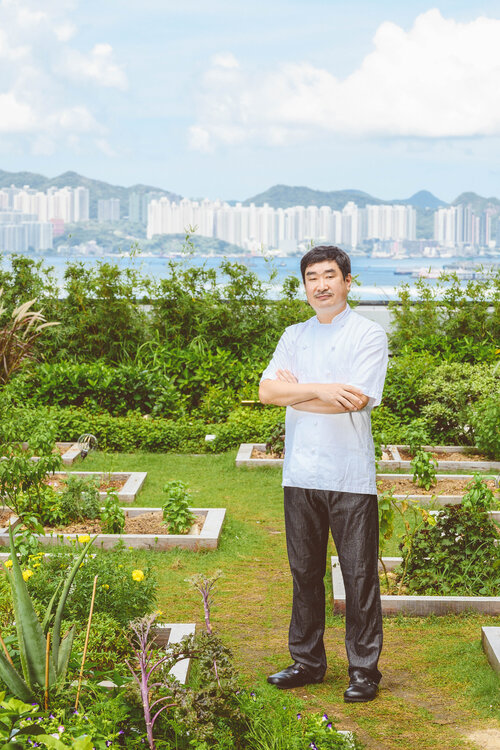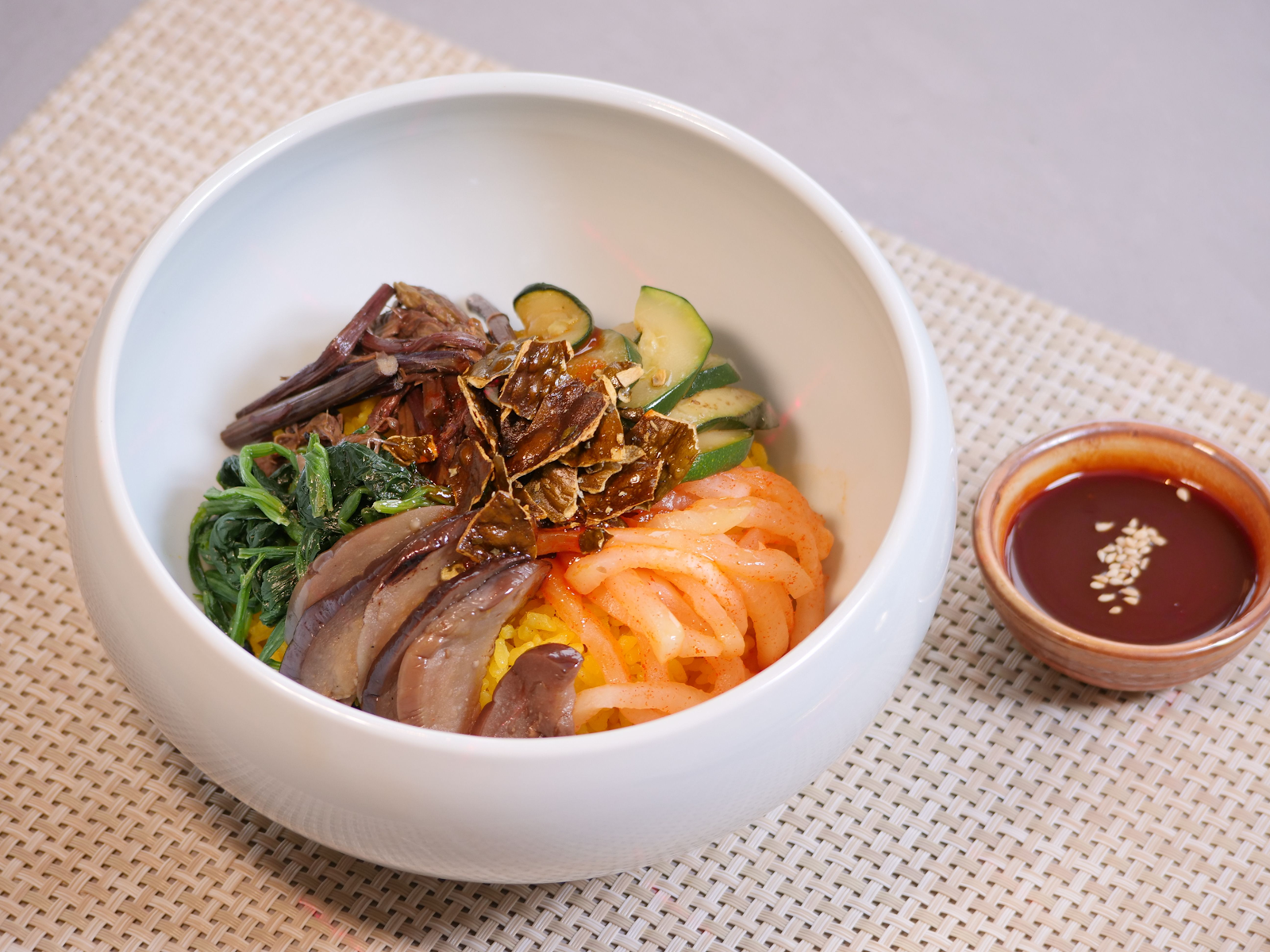Meet Chef Gu Jin Kwang – executive chef of contemporary Korean vegetarian restaurant Soil to Soul

A few minutes every morning is all you need.
Stay up to date on the world's Headlines and Human Stories. It's fun, it's factual, it's fluff-free.

As the world becomes increasingly health and environmentally conscious, you have probably heard at some point that your body is a temple. For those of us in Hong Kong, that approach is easier said than done. With our many Michelin restaurants and array of international cuisines, temptation is everywhere – not that we’re complaining.
But on days when you’re looking for something cleaner to indulge in, look no further than Soil to Soul. This new concept restaurant nestled at the top of K11 Musea offers a fresh, contemporary spin on Korean traditional temple cuisine.
Just walking into the restaurant feels like an escape from the city – a retreat worthy of “Eat, Pray, Love.” You are greeted immediately with an incredibly zen soundtrack, drowning out any urban disruptions. During the day, sunlight floods into the space through large windows and reflects off the gold accents of the elemental decor.
As the name suggests, Soil to Soul shines a light on unique, natural ingredients and their nourishing properties for our bodies and souls. Beyond just guilt-free eating, they also embody guilt-free consumption, as they encourage diners to eat what they need and minimize food waste and environmental pollution.
Acting in full compliance with the Buddha dharma, they also refrain from using the five pungent herbs – garlic, green onion, leek, chives and onion, which are believed to distract the mind with impure thoughts or lead to anger. At Soil to Soul, they take it a step further and avoid using other flavoring agents such as salt, sugar and MSG, choosing instead to highlight and elevate the flavors of natural ingredients through fermentation and marination.
The mastermind behind it all is ‘World Master Chef’ Gu Jin Kwang, a certified temple food specialist from Korea. I met with chef Gu to talk about his culinary journey and what inspires his modern interpretation of Korean temple cuisine.
A culinary journey, from fine dining to temple techniques

Chef Gu was first introduced to cooking by his mother while he was growing up in Busan, South Korea. “My mom cooked very good,” Gu says. “We lived in the countryside so she always [made] Korean traditional food.”
After studying electronic engineering in Korea, Chef Gu moved to London to gain more international exposure. Reminiscing on his far-from glamorous beginnings in the culinary industry, he recounts his experiences doing part time jobs like delivering newspapers and washing dishes before he was allowed to cook. “I worked at many restaurants like Korean and Japanese, but only serving, not really chef,” he explains.
His first encounter with French cuisine came when he got a part time job as a kitchen porter at a French restaurant. After witnessing the excitement of the kitchen, Chef Gu was determined to get a job there, “I worked there for free for three or four months first, but I just continued working and finally they let me cook,” he says. From there, he worked his way up to sous chef before working at other restaurants, including 2 Michelin-starred Le Gavroche under legendary chefs Albert and Michel Roux.
When he returned to his native Korea, Chef Gu reflected on his time abroad. “I did eleven years in London learning French cuisine, all from French recipes and French people and their food,” he remembers. “I do French cuisine, Italian and Western style food. I don’t have my own food.” As he considered his next step, what weighed on his mind was: “What about Korean traditional food?”
Soon after this, he came across traditional temple cooking. “All their ingredients [are] natural … then it must last for [a] few months, or longer, [a] few years,” says Chef Gu, as he describes the ingenious ways that Buddhist nuns handle and preserve food. “It’s very simple, but very interesting,” he says. “[At the temple] they have special vegetable skills … they make pickles, they dry [food] and it becomes like tea.”
One thing that Chef Gu is particularly known for is his use of sauce, and it was a sauce that really cemented his interest in temple food. He fondly remembers the time that he sampled batches of soy sauce that were five, ten and twenty years old while he was training in temple cooking techniques and philosophy under renowned Buddhist nun WooKwan. “Oh how it’s different!,” raves Chef Gu, “soy sauce should be black and very salty, but after 20 years … [it becomes] deep and dark … not only salt, but more sweet and salt.”
Sharing the natural beauty of the ingredients
What Chef Gu now wishes to share through his cooking are these unknown flavors that are locked away in natural ingredients. “People usually don’t know [about this], they only know [what they see] at the market … they don’t get the wild ones … they don’t know the taste of original vegetables,” he explains.
It was for this reason that Chef Gu agreed to open this new restaurant in Hong Kong. As a city that is “famous for [having] lots of cool restaurants,” he noticed that despite the many Michelin restaurants and cool concepts, there remained a gap in the fine dining scene for a restaurant like Soil to Soul. “We are try to be natural … or vegetarian, even temple food … [but] nobody tried this,” he says.
However, his transition to Hong Kong has not been without challenges. Since temple food is all about making use of and working with the surrounding environment, Chef Gu admits that the initial switch was challenging because “I don’t know [about] the weather and all the local ingredients … [it’s] different from Korea.” Despite having many original temple recipes under his belt, he recalls how hard it was to “match with these local vegetables.”
“In the end I still have to take things from Korea,” he adds with a chuckle. “Like kimchi or [other] imported things [that] I can’t buy here.” Still, for the menu to become what it is now, Chef Gu relied mostly on his 26 years of experience and a lot of trial and error. “One day I’ll make this way … no thinking, just try [and if it] doesn’t work, then okay.”
As someone who is heavily influenced by nature, Chef Gu finds himself drawn to Hong Kong’s many hikes and nature trails when in search of inspiration. “Since I came to Hong Kong, I think I’ve hiked over 700km on the trails. If [I have] no ideas, I go to [the] mountain trail and walking and thinking.”
Even after months of living in Hong Kong, there are still many occasions in which Chef Gu visits the mountains in search of direction as he continues to innovate and come up with new ways to bring temple food to fine dining. I ask him why he thought temple food was a fitting concept for a fine dining establishment, given the contrast between their respective simplicity and luxury.
He points out that despite obvious differences, both temple food and fine dining focus on the experience of eating and the abundance of the ingredients. Fine dining should be a multisensory experience, he explains, which is why plating is very important. “When you first get your plate, the first thing you [use] is [your] eyes …and then smell, then taste,” he states. However, when temple food gets added into this equation, it targets something deeper. “The last thing [is] your feeling … when you eat, you feel very comfortable.”
Chef Gu describes the process of bringing temple food and fine dining together as one that is infinite and constantly evolving. “There are all these mountains [here] but nobody knows what they have, even I’m still searching, even in Korea [they’re] searching,” he elaborates. “Everything [comes] all together from the wild … and [it] takes a long time … one by one.”
Is your business doing something cool that you want to show off? Get in touch at hello@themilsource.com




Comments ()